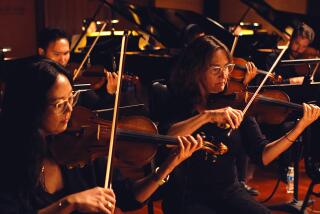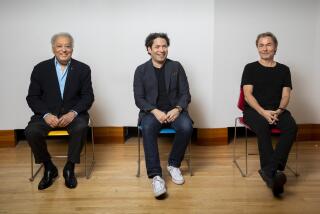MUSIC REVIEW : UCSD Musician Tackles Reynolds Work With Aplomb
LA JOLLA — Since the formation of the UC San Diego music department in the late 1960s, its success has depended on a community of composers balanced by resident performers capable of realizing their creations. Aleck Karis’ piano recital Thursday in UCSD’s Warren Studio A demonstrated the continued health of this laudable symbiosis. Karis, a recent addition to the faculty, eloquently performed the premiere of “Variation” by Roger Reynolds, the university’s Pulitzer Prize-winning senior composer-in-residence.
Reynolds’ daunting 1988 opus had remained on the composer’s shelf waiting for a performer with sufficient technique and insight to undertake it. Karis fulfilled the assignment with aplomb.
“Variation” does not follow a traditional theme and variation format. Instead of decorating a theme in successive installments, Reynolds subjects the work’s opening motive, a flamboyant arabesque, to a continuous transformation not unlike the subtle shiftings of a kaleidoscope. In overview, these permutations form a kind of archipelago, a chain of irregular but contiguous components. (Not surprisingly, “Archipelago” is the title of Reynolds’ 1983 work for chamber orchestra.)
The mood of “Variation” shares the emotional intensity and metaphysical gravity of “Whispers Out of Time,” the composition for string orchestra that won Reynolds the 1989 Pulitzer Prize. Reynolds’ keyboard rhetoric in “Variation” owes much to the declamatory style of the Second Viennese School, although the California composer constructed his figures more playfully than did his Austrian predecessors.
Karis, whose firm, authoritative touch and supple technique made a compelling case for Reynolds’ new opus, will perform “Variation” in New York in December. In his Thursday recital, Karis thoughtfully surrounded the new Reynolds opus with two 20th-Century sonatas, Sonata No. 5 by Sandor Jemnitz and Igor Stravinsky’s affable neoclassical Sonata (1924).
In both the Jemnitz and the Stravinsky, Karis crafted contrapuntal textures with elegantly translucent precision, and he relished each composer’s wit with stylish inflection. Karis closed the program with a splendidly executed but less than passionate interpretation of Chopin’s familiar B Minor Sonata. Although the third movement’s poetry was compelling, the finale lacked its wonted panache. He offered Chopin’s Mazurka, Op. 24, No. 2, as an encore.
More to Read
The biggest entertainment stories
Get our big stories about Hollywood, film, television, music, arts, culture and more right in your inbox as soon as they publish.
You may occasionally receive promotional content from the Los Angeles Times.










